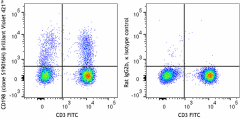- Clone
- S19016H (See other available formats)
- Regulatory Status
- RUO
- Other Names
- CC-CKR-8, C-C CKR-8, CCR-8, CC chemokine receptor 8, CDw198, CDw198 antigen, CD198, chemokine (C-C motif) receptor 8, chemokine (C-C) receptor 8, TER1, ChemR1, and CKR-L1
- Isotype
- Rat IgG2b, κ
- Ave. Rating
- Submit a Review
- Product Citations
- publications

-

Human peripheral blood lymphocytes were stained with anti-human CD3 FITC and anti-human CD198 (CCR8) (clone S19016H) Brilliant Violet 421™ (left), or rat IgG2b, κ Brilliant Violet 421™ isotype control (right).
| Cat # | Size | Price | Quantity Check Availability | Save | ||
|---|---|---|---|---|---|---|
| 365813 | 25 tests | 152€ | ||||
| 365814 | 100 tests | 316€ | ||||
CCR8, also known as ChemR1, TER1, and CKR-L1, belongs to the beta chemokine receptor family. It is predicted to be a seven transmembrane protein similar to G protein-coupled receptors. CCR8 is expressed on some subsets of T cells, monocytes, macrophages, eosinophils, thymocytes, Langerhans cells, neurons, and vascular smooth muscle cells. Binding with its ligand CCL1, CCR8 plays a role in the regulation of monocyte chemotaxis and thymic cell apoptosis. It has been reported that CCR8 is also a receptor for CCL18. CCR8 is also believed to be an alternative coreceptor to CD4 for HIV-1 infection.
Product DetailsProduct Details
- Verified Reactivity
- Human
- Antibody Type
- Monoclonal
- Host Species
- Rat
- Immunogen
- Human CCR8-transfected cells
- Formulation
- Phosphate-buffered solution, pH 7.2, containing 0.09% sodium azide and BSA (origin USA)
- Preparation
- The antibody was purified by affinity chromatography and conjugated with Brilliant Violet 421™ under optimal conditions.
- Concentration
- Lot-specific (to obtain lot-specific concentration and expiration, please enter the lot number in our Certificate of Analysis online tool.)
- Storage & Handling
- The antibody solution should be stored undiluted between 2°C and 8°C, and protected from prolonged exposure to light. Do not freeze.
- Application
-
FC - Quality tested
- Recommended Usage
-
Each lot of this antibody is quality control tested by immunofluorescent staining with flow cytometric analysis. For flow cytometric staining, the suggested use of this reagent is 5 µL per million cells in 100 µL staining volume or 5 µL per 100 µL of whole blood. It is recommended that the reagent be titrated for optimal performance for each application.
Brilliant Violet 421™ excites at 405 nm and emits at 421 nm. The standard bandpass filter 450/50 nm is recommended for detection. Brilliant Violet 421™ is a trademark of Sirigen Group Ltd.
Learn more about Brilliant Violet™.
This product is subject to proprietary rights of Sirigen Inc. and is made and sold under license from Sirigen Inc. The purchase of this product conveys to the buyer a non-transferable right to use the purchased product for research purposes only. This product may not be resold or incorporated in any manner into another product for resale. Any use for therapeutics or diagnostics is strictly prohibited. This product is covered by U.S. Patent(s), pending patent applications and foreign equivalents. - Excitation Laser
-
Violet Laser (405 nm)
- Application Notes
-
Clone S19016H induces complement-dependent cytotoxicity (CDC) and antibody-dependent cellular phagocytosis (ADCP) on CCR8-transfected cells.
- RRID
-
AB_3097394 (BioLegend Cat. No. 365813)
AB_3097394 (BioLegend Cat. No. 365814)
Antigen Details
- Structure
- Seven hydrophobic transmembrane domains
- Distribution
-
Vascular smooth muscle cells, macrophages, eosinophils, peritoneal macrophages, thymocytes, T cells, Langerhans cells and neurons
- Cell Type
- Tregs
- Molecular Family
- CD Molecules, Cytokine/Chemokine Receptors
- Antigen References
-
- Tiffany HL, et al. 1997. J Exp Med. 186:165-70.
- Goya I, et al. 1998. J Immunol. 160:1975-81.
- Lee S, et al. 2000. J Virol. 74:6946-52.
- Chensue SW, et al. 2001. J Exp Med. 193:573-84.
- Qu C, et al. 2004. J Exp Med. 200:1231-41.
- Isolam SA, et al. 2013. J Exp Med. 210:1889-98.
- Gene ID
- 1237 View all products for this Gene ID
- UniProt
- View information about CD198 on UniProt.org
Related FAQs
- What is the F/P ratio range of our BV421™ format antibody reagents?
-
It is lot-specific. On average it ranges between 2-4.
Other Formats
View All CD198 Reagents Request Custom Conjugation| Description | Clone | Applications |
|---|---|---|
| PE anti-human CD198 (CCR8) | S19016H | FC |
| Purified anti-human CD198 (CCR8) | S19016H | FC |
| Ultra-LEAF™ Purified anti-human CD198 (CCR8) | S19016H | FC |
| APC anti-human CD198 (CCR8) | S19016H | FC |
| PE/Cyanine5 anti-human CD198 (CCR8) | S19016H | FC |
| Brilliant Violet 421™ anti-human CD198 (CCR8) | S19016H | FC |
| PerCP/Cyanine5.5 anti-human CD198 (CCR8) | S19016H | FC |
| Brilliant Violet 711™ anti-human CD198 (CCR8) | S19016H | FC |
Compare Data Across All Formats
This data display is provided for general comparisons between formats.
Your actual data may vary due to variations in samples, target cells, instruments and their settings, staining conditions, and other factors.
If you need assistance with selecting the best format contact our expert technical support team.
-
PE anti-human CD198 (CCR8)

Human peripheral blood lymphocytes were stained with CD3 APC... -
Purified anti-human CD198 (CCR8)

Human peripheral blood lymphocytes were stained with anti-hu... -
Ultra-LEAF™ Purified anti-human CD198 (CCR8)

Human peripheral blood lymphocytes were stained with anti-hu... -
APC anti-human CD198 (CCR8)

Human peripheral blood lymphocytes were stained with anti-hu... -
PE/Cyanine5 anti-human CD198 (CCR8)

Human peripheral blood lymphocytes were stained with anti-hu... -
Brilliant Violet 421™ anti-human CD198 (CCR8)

Human peripheral blood lymphocytes were stained with anti-hu... -
PerCP/Cyanine5.5 anti-human CD198 (CCR8)

Human peripheral blood lymphocytes were stained with anti-hu... -
Brilliant Violet 711™ anti-human CD198 (CCR8)

Human peripheral blood lymphocytes were stained with anti-hu...
 Login / Register
Login / Register 














Follow Us